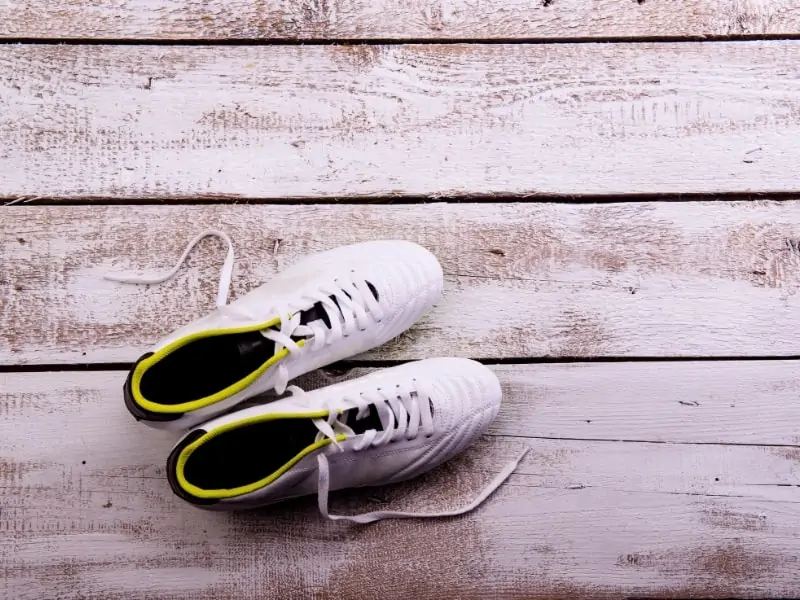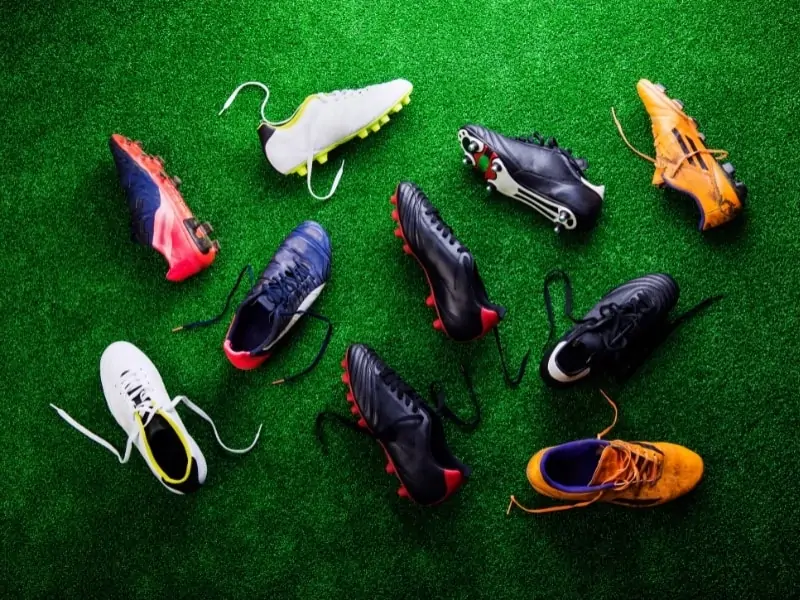Share the post "How To Spray Paint Soccer Cleats (Step By Step)"
Soccer cleats can be expensive, and many people don’t like to spend a lot of money on shoes they will purposely destroy.
It is possible to go from spendy cleats to spray paint ready in a matter of minutes.
In this piece, I will go over the following items;
- Tips and tricks
- Materials needed for spray painting
- Steps to spray paint soccer cleats

Tips on How to Spray Paint Soccer Cleats
When you are ready to paint your cleats, make sure that you are not doing it in the strong wind because this will cause the spray paint to blow around and create unwanted splatters.
Also, be sure to use a few coats of black paint instead of just one because this will give the cleats a more even look upon completion. Be sure to use the following tips to learn how to spray paint your cleats the right way.
1. Wash The Cleats First
Before you even think about painting your cleats, you have to wash them because they probably have a bunch of stuff stuck all over them from being used.
Even if they don’t have anything on them, it is always a good idea to clean off any surface before applying paint to it to stick evenly.
2. Tape Off The Areas Where You Want The Design To Be
It’s not difficult for this step; all you have to do is take some painter’s tape and place it across the parts of the shoes where you want a certain color blocking pattern or another design.
If you want something simple, use one stripe of tape down either side of your shoe as a guide when painting your cleats.
If you want creative freedom, then take a painter’s tape and make it go all the way around the shoe; this means that there will be no risk of paint spilling onto another part of your shoes or ruining an existing design.
3. Use Spray Paint to Apply The Black Base Coat
Even if you don’t want to add any creative effects like color blocking or other designs that require using spray paint.
Then at least use it for the base coat because that’s what’s going to prevent your Chelsea boots from looking like regular boots with some red soccer studs painted on them.
Use short bursts when spraying (and don’t hold the can too close) so you don’t get any paint spilling onto other sections of your shoes.
Just be sure to hold the can about 1-2 inches away from your shoe and spray it evenly across the surface because you want the paint to cover as much area as possible.
Also, please don’t hold the can too close to your cleats, or it will cause them to drip; instead, use short bursts when spraying so that it doesn’t come out too quickly onto your cleats.
4. Use Sand Paper (optional)
There isn’t a big difference between using sandpaper and not using sandpaper.
However, using sandpaper first before painting does provide more grip for the entire design, so there’s less likely hood of you accidentally scraping off some paint and ruining what you spent hours doing.
5. Apply Top Coats
Once your cleats have dried, apply one or [more] coat [s] of clear acrylic paint to add a glossy effect and protect the base color from wearing away when in contact with the ground.
6. Let Them Dry
Make sure that they are completely dry before using them, or else they could easily get dirt and dust stuck between the layers of paint, which will ruin the design and look tacky in general.
It would also be a good idea to let them sit for at least 24 hours after applying the final layer of paint so that it has ample time to dry completely. I’d say no less than 48 hours so that you’ll know for sure they are dry enough to use.
7. Put Them On
Grab your cleats and put one of them on before spraying paint onto the other one because this way, you will be able to tell whether or not there is an even amount of paint across both shoes.
If there is too much paint, then spray less onto one shoe; keep doing this until the two shoes have an even coating of paint applied to them.
After you’re satisfied with how it looks, take off the shoe that’s already painted and spray paint the other one using the same method as above (hold the can about 1-2 inches away from your cleat).
When both shoes are finished, allow them to dry for at least 48 hours before wearing them completely, or else they could get ruined.

What Materials are Needed For Spray Painting Soccer Cleats?
There are a number of supplies that you will need to complete your cleat design. Some of the items on the list are common household items, while others are more specific.
You can find most of what you need at your local hardware or home improvement store. Here is an inclusive list of all the materials needed for spray painting soccer cleats:
Matte Black Spray Paint
These are important because not all spray paints are created equally.
If you go to a big box store like Wal-mart, they usually only carry high gloss and clear coat finishes, which will not work for this project because your cleats will look plastic.
Rustoleum makes the matte black paint I use; however, dozens of different brands make spray paint in many different colors and finishes (including multi-colored options!).
Make sure to find the right kind of matte black before starting this project!
Tape or Painters Tape
You will want to use painter’s tape because it is superior to regular masking tape for this project.
Regular masking tape has the potential to leave a sticky residue after it comes off of your cleats because it uses an adhesive as opposed to painter’s tape, which uses static electricity.
Microfiber Cloths or Newspaper
These items will be used because they are disposable and can quickly clean up those inevitable paint spills you will encounter along the way.
They also absorb more liquid than any other material, so these items are extremely helpful along the journey that lies ahead.
Sandpaper
This is a necessary part of prepping your cleats before painting them. Be sure not to skip this step because the paint won’t stick to the cleats if they are not sanded down first.
Plastic Baggies
These will be used as a makeshift paint palette so you can mix your colors before spraying them onto your cleats.
It is far easier to use small pieces of a plastic bag than to carry around an entire palette and dirty it up with spilled paint that will never dry again once your project is done.
Shoe Horns
You don’t want any unnecessary wrinkles in your uniform, so shoe horns will help keep things smooth.
In addition, some paints can take several hours to dry on a surface fully, so using a shoehorn as opposed to wearing the shoes after painting them helps ensure that there won’t be any damage to your cleats while they are still wet.
Rubbing Alcohol or Acetone
This will be used to remove any loose debris that may get stuck within your design after you spray it onto your cleats.
Of course, make sure not to use this on surfaces with tape; only use the rubbing alcohol/acetone mixture for areas with no paint.
Sand Paper
This is another important step in preparing your shoes before painting them. It helps if you go over them with sandpaper first because this roughs up the surface the shoemaking it easier for the paint to adhere to.
If you don’t want to do that, then wipe down your cleats with a damp cloth to ensure they are free of dirt and oil.
Spray Paint (optional)
If you want to add any designs other than the basic colors, then you will need this for sure. I recommend using spray paint because it is ideal for large applications like custom cleats.
Of course, if you would rather use another medium like markers or sharpies, that works too.
Painters Tape (optional)
This is optional because painter’s tape serves no practical purpose when painting your shoes; however, it can serve as a guide while you’re painting so that your design stays symmetrical.
Plus, painter’s tape isn’t permanent so once your project is finished, take it off.
What are The Steps to Spray Paint Soccer Cleats?
Before you start, make sure you have all the supplies and materials necessary. You will want to start with a clean pair of soccer cleats.
Remember that most retail solvents are extremely flammable and toxic, so please do not use them indoors or near open flame. Below are the steps that you should follow when spray painting your soccer cleats.
1. Preparation
Make sure the cleats are clean! Dirt, debris, and any other type of unwanted material will affect how well the paint sticks to the cleat. Use a wire brush or even an old toothbrush to remove any dirt or grime from the surface.
Once they are good and clean, use some solvent (a retail cleaner should work fine) to wipe away any leftover residue. Wait for them to dry completely before moving on.
2. Choose Your Color Scheme
The color scheme you choose is totally up to you; there isn’t too much science involved here. Just make sure that your chosen colors compliment each other; it would be pretty strange if all your cleats were neon green.
Once you have decided on your color scheme, make sure to prepare the surface; if they are not clean already (see step one), then use some solvent to clean them again.
3. Apply Primer
Using medium-grade sandpaper (or something similar), rough up the painted surfaces of your cleats enough that the paint will stick well.
Spray the primer onto the cleats in thin coats until it is uniformly covered and let them dry for at least three hours before moving on.
Do not apply too much or risk ruining the overall effect later on when trying to paint over it with more than one layer of color.
4. Paint Time!
Once your primer has fully dried, you can begin painting your cleats.
Apply the color coats as desired; make sure to give enough time to let each layer dry before adding another (usually about an hour).
You may choose to do more than one coat; if so, make sure you wait for each coat to dry completely before continuing onto the next.
5. Add a Protective Coat
After your design and paint have dried fully, it is time to add one final protective coating; usually, enamel or lacquer does the trick nicely.
Ensure that all areas where the paint will be applied are free of debris and dust, then apply several thin coats until you’re satisfied with how they look (usually overnight should do it).
When finished, protect them from being scuffed by using the same kinds of liquids that you used for your spray paint (solvents, etc.).
Sources
- https://askinglot.com/can-i-paint-my-cleats
- https://findanyanswer.com/how-do-you-remove-spray-paint-from-cleats
Share the post "How To Spray Paint Soccer Cleats (Step By Step)"
Joel is a seasoned soccer journalist and analyst with many years of experience in the field. Joel specializes in game analysis, player profiles, transfer news, and has a keen eye for the tactical nuances of the game. He played at various levels in the game and coached teams - he is happy to share his insight with you.



